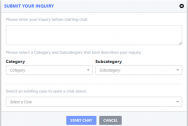For an HR Case Management Shopping List, Consider Five Features of a Full-platform HRIS
It’s true that an HR case management solution is only one piece of a comprehensive HRIS solution. HR case management lives under the big umbrella of software solutions that help streamline the whole spectrum of HR management system functions, from benefits administration, to time and attendance, to performance reviews and succession planning.
Yet all of the pieces within an HRIS share two overarching goals: to help HR professionals manage their workforce more efficiently and to empower employees. Just as with a full-platform HR management system (HRMS), you also want an HR case management solution that will increase HR productivity by automating administrative processes and supporting HR on a strategic level.
For example, when an HR help desk/case management system is incorporated into a comprehensive talent management strategy (one slice of a full HR service system), your organization can truly provide full life-cycle support for incoming employees and ultimately contribute to measurable performance gains. Going a step further, the best case management systems, such as LBi HR HelpDesk, work seamlessly with both your HR delivery software and the leading talent management applications.
So it only stands to reason that if you want to find an HR case manager and call-tracking workflow solution that hits all of those same goals, you ought to go shopping for a list of features that are very similar to the ones suggested for a full-platform HRIS system. Here are five top features to consider.
1. Software-as-a-Service technology
Vendors of HR software have embraced Software-as-a-Service (SaaS), a Web-based deployment method, for their solutions. SaaS applications are easy to implement and update, can be accessed by administrators and employees from almost any device that has an Internet connection, and relieve an organization’s IT staff from the burden and costs of purchasing and maintaining expensive hardware and software.
High-quality SaaS solutions also leverage the technological advantages of cloud computing at a fraction of the cost and labor of self-hosted systems. LBi HR HelpDesk, for example, offers nightly backups, full firewall protection, 99.9 percent guaranteed uptime, and a proven disaster recovery plan.
2. Cloud-based environment
The trend among HR technology vendors to embrace the cloud has been a huge boost for HR leaders in organizations of all sizes. Most significantly, it’s empowered HR to leverage best-of-breed solutions without placing excessive demands and stress on IT departments. Before the cloud, enterprise IT departments had to integrate and host multiple applications to get best-of-breed solutions. With the cloud, the HR vendor does the hosting and integration for you.
Cloud computing also gives you maximum performance from your HR software at the lowest possible cost. A savvy HR case management developer will take advantage of this trend and ensure certain integration with your HRIS, if that’s the route you choose to go.
3. Dedicated server option
A dedicated server gives you the maximum performance and security for any SaaS solution. How? At LBi Software, for example, when we deploy LBi HR HelpDesk for a dedicated-server client, we include a separate instance of the application, database, operating system, and Web server. No other client data or business application resides on that client’s server.
If your organization seeks this level of security comfort, again make sure your system is hosted on a dedicated server in a SAS 70 Type II/SSAE 16 Type II compliant secure hosting facility.
4. Unimpeachable security
As with any other type of HRIS, a cloud-based, SaaS application needs to ensure your data is secure and employee confidentiality is never breached. Again, for an HR case management solution, look for many of the features that you’d want in other areas of a full-platform HRIS system:
- Configurable security access
- Complete audit trails of all cases
- Integration with Single Sign-on (SSO)
- Tracking of all interactions with employees
- Multiple priority levels
5. Employee self-service
More organizations are seeing the benefit of employee self-service, from enrolling for benefits to getting answers about benefits and HR policies year-round. Employee self-service – optimally through an employee portal – has become a proven route to greater employee engagement, which in turn has a direct positive impact on the bottom line.
An HR case management solution that offers employee self-service should at least allow employees to:
- View a history of their cases
- Create new cases directly through the Web or by email
- Directly access a knowledge base of commonly asked questions
Some employees will access the system repeatedly. Some rarely, or not at all. But knowing the option is there for them heightens employee engagement and can potentially save HR time and money. Download this recent White Paper for more information on how LBi HR HelpDesk can drive and measure employee engagement.





